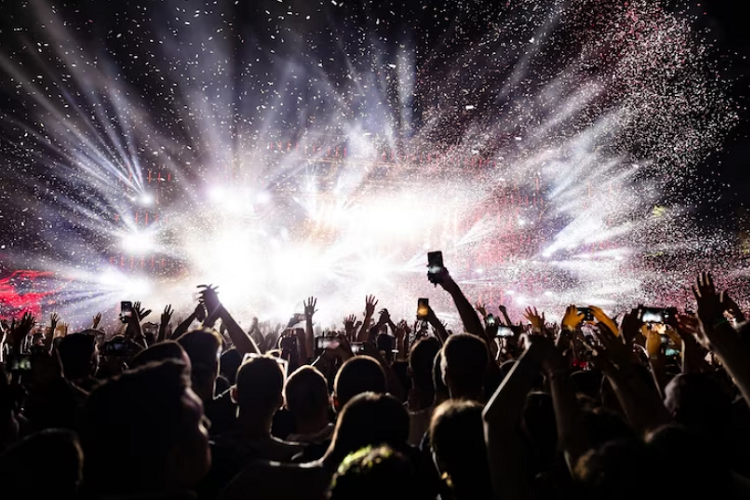The answer to the question “Why do people go to concerts?” is pretty straightforward. People go to concerts to experience the thrill of live music, connect emotionally with their favorite artists, create a sense of community, escape routine, socialize and bond with others, discover new music, and create lasting memories. The allure of the live concert experience continues to attract music enthusiasts of all ages and backgrounds.
People go to concerts for a variety of reasons, and these motivations can differ from person to person. Whatever your reason for going to a show, you are likely to benefit of attending concerts it in some way.

10 Reasons Going to Concerts
Concerts can provide you with entertainment, education, motivation, inspiration, relaxation, satisfaction, and more. Here are some common reasons why people go to concerts.
1. Live Experience
Attending a concert offers a unique and unparalleled live experience. It allows individuals to witness their favorite artists performing in real time, immersing themselves in the energy and atmosphere that can’t be replicated through recorded music. The thrill of being in the same physical space as the artists and hearing their live music is a major draw for many concertgoers.
2. Emotional Connection
Music has the power to evoke strong emotions, and concerts provide an opportunity for people to connect with the music on a deep emotional level. The live performance, combined with the shared enthusiasm of the audience, intensifies this connection. It can be a cathartic experience, allowing individuals to experience a range of emotions and feel a sense of release or bond with the music and the artist.
3. Sense of Community
Concerts bring people together who share a common love for a particular artist, band, or genre. Attending a live show creates a sense of community and belonging among fans. It provides an environment where individuals can connect with like-minded people, share their passion, and create lasting memories. The shared experience fosters a feeling of camaraderie and solidarity.
4. Escaping Routine
Concerts offer a temporary escape from the monotony of everyday life. They provide an opportunity to break away from routine and immerse oneself in a world of music, entertainment, and excitement. The atmosphere, the lights, and the energy of a concert create an alternate reality where people can let loose, forget their worries, and simply enjoy the moment.
5. Socializing and Bonding
Attending concerts is often a social activity. Whether going to concerts alone, with friends, or with family, such events provide an excellent opportunity to socialize and bond with others. Sharing the experience with others who have similar musical interests can strengthen friendships and create shared memories. Concerts also serve as conversation starters and icebreakers, facilitating connections with new people who share a common love for music.
6. Discovery and Exploration
Concerts can be a platform for discovering new artists, genres, or music styles. Many concerts feature opening acts or supporting bands, providing an opportunity to explore different sounds and expand one’s musical horizons. Exposure to new music at concerts can spark curiosity and lead to further exploration and discovery beyond the event itself.
7. Unforgettable Memories
Attending a concert is often an unforgettable experience. The combination of live music, the energy of the crowd, and the unique atmosphere can create memories that last a lifetime. The excitement, anticipation, and emotional impact of a live performance contribute to the creation of cherished memories that individuals can look back on with fondness.
8. Celebration and Festivity
Concerts often have a festive atmosphere, especially during music festivals or larger-scale events. They can serve as a celebration of music, culture, or a particular milestone, bringing people together for a shared celebration.
9. Appreciation of Musical Craftsmanship
Attending a concert allows music enthusiasts to witness the technical skills and artistry of musicians up close. It offers a deeper appreciation for the complexities of live performance, instrument mastery, vocal range, and overall musical craftsmanship.
10. Unique Performances
Artists often add special elements to their live performances, such as extended instrumental solos, improvisations, or surprise guest appearances. These unique moments can make attending a concert a one-of-a-kind experience that fans don’t want to miss.
The pros and cons of going to concerts alone
The idea of going to live music concerts alone may seem intimidating or boring for some people, but it can actually be a rewarding and liberating experience. Here are some of the advantages of going to concerts alone:
- You can choose the show you want to go to without compromising with anyone else
- You can arrive and leave whenever you want without worrying about anyone else’s schedule
- You can get closer to the stage or move around freely without losing your group
- You can focus on the music and the performance without any distractions
- You can meet new people who share your taste in music or join online communities of fans
- You can challenge yourself and overcome your fears or insecurities
Of course, going to concerts alone may also has some drawbacks, such as:
- You may feel lonely or awkward at times
- You may miss having someone to share your excitement or opinions with
- You may feel unsafe or uncomfortable in certain situations or environments
- You may have trouble finding transportation or accommodation
To make the most out of your solo concert experience, you should plan ahead, be prepared, be confident, be respectful, and be open-minded.
Some fun activities you can do at a concert
Have you ever wondered what your answer would be if someone asked you a question like, “Tell me something you might do at a concert.”? There are many things you can do at a concert besides listening to the music. Some of them are:
- Sing along or dance to the songs
- Take photos or videos of the performers or yourself
- Buy merchandise or souvenirs from the venue or vendors
- Cheer or clap for the artists or show your appreciation in other ways
- Request songs or shout-out messages to the artists
- Hold up signs or banners with messages or images
- Wave light sticks or flashlights in sync with the music
- Participate in fan chants or projects organized by fan clubs
- Chat or mingle with other fans or strangers
- Play games or trivia related to the artists or songs
How listening to live music differs from recorded music
Listening to live music is different from listening to recorded music in several ways. Some of them are as follows:
- Live music is more dynamic and spontaneous than recorded music. You never know what might happen next, such as improvisations, collaborations, mistakes, surprises, or interactions.
- Live music is more authentic and expressive than recorded music. You can hear the raw emotions and nuances of the artists’ voices and instruments, as well as their personalities and style.
- Live music is more immersive and interactive than recorded music. You can feel the vibrations and sensations of the sound waves, as well as the atmosphere and mood of the venue and crowd.
- Live music is more memorable and impactful than recorded music. You can create lasting memories and impressions of the artists and songs, as well as associate them with specific times and places.
Listening to live music can enhance your appreciation and enjoyment of music in general. It can also expose you to new genres, styles, and cultures of music that you may not encounter otherwise.
These are just a few reasons why people go to concerts. Ultimately, the motivations can vary depending on personal preferences, musical tastes, and individual experiences.


